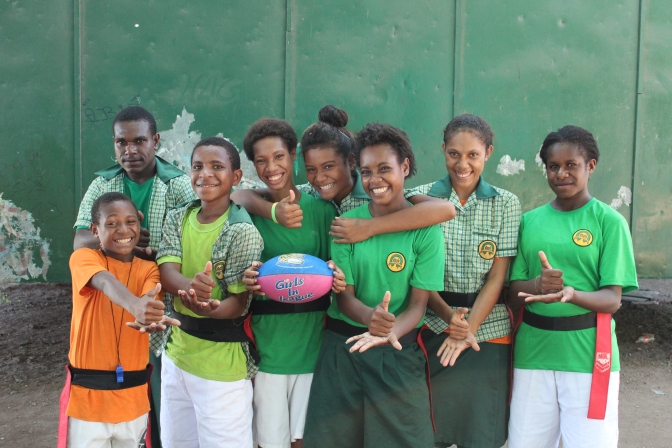The Commonwealth Youth Council had the opportunity to catch up Equal Playing Field for Schools Programme (EPF4S). The overall goal of EPF4S is to prevent violence against women and children through promoting gender equality.
Each EPF Schools Project is an eight-week respectful relationships programme that aims to prevent violence against women, by promoting gender equality and changing the attitudes and behaviours that enable violence against women to occur. During the program, 13-15 year-old boys and girls (Grades 7-8) take part in a mixed gender sports competition that combines respectful relationship education, with skills development and games. Each week, the teams rotate between competing in recreational matches, where they refine their on-field skills, and participating in educational sessions on different topics relating to respect and relationships. Each week of the EPF Schools Program contains a different topic relating to respect and relationships. These include understanding types of violence and abuse, developing support networks and knowing where to seek help, developing empathy for others, managing anger and stress, and others. Throughout the sessions, sporting metaphors (such as the concepts of boundaries, teamwork, fair play etc.) are used to explain new ideas. All of the topics covered in the EPF Schools Program correlate with both the Australian and Papua New Guinean Years 7-10 personal development and physical education curriculum.
Jacqui Joseph, co-founder, shared some more insight into their work and passion for sports for community development:
Q: What is your greatest achievement?
A: As an organisation it took us four years to become a fully-fledged office which is a great achievement because we were once just ideas in the minds of the co-founders. Although it took us time and patience to be who we are today we look back and appreciate every challenge and obstacle that helped us to be who we are today.
Q: Why do you think sports is so important for community development?
A: Sports is a great tool to use. It has concepts that can be easily understood especially when explaining what it means to work as a team and appreciating the different talents that everyone have. When working with young people sports is effective because it allows us put our theory lessons into practice.
Q: Do you have any message or advice for young people
A: Every young person has got unique skill and talent that the world needs. There’s nothing such as failure, there’s a reason why things don’t work and there is never any room to “give up” if you are looking to succeed.
The students who have been through the EPF4S programme have said the most significant change since EPF began working in their school students have reported the following:
• A reduction in sexual assault
• Increased positive play between male and female students
• An increased understanding of gender equality
• A reduction in physical violence
• A greater respect between all students.
The programme runs in schools as evidence from around the world has shown that schools are an effective setting to deliver relationship education to young people. This is age when young people are beginning to develop their identity and explore relationships with each other. By encouraging safe and respectful relationships at a young age we believe that we can stop violence against women before it occurs.
Papua New Guinea continues to benefit from this programme as it has some of the highest rates of violence against women and children anywhere in the world. EPF4S strongly believes that ending gender based violence is the only way for PNG to reach its fullest potential.





I like very much your program.courage.
LikeLike